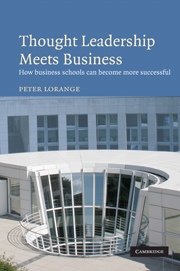Book contents
- Frontmatter
- Contents
- List of figures
- List of tables
- Foreword
- Preface
- 1 Background and conceptual framework
- 2 Key academic programs and academic value-creation
- 3 The critical role of R&D
- 4 Marketing strategy
- 5 Institutional learning
- 6 Human resources strategy
- 7 The learning partner perspective
- 8 Business school leadership issues
- 9 Conclusion: So, what are the key success factors?
- Appendix I
- Appendix II: core references
- Index
9 - Conclusion: So, what are the key success factors?
Published online by Cambridge University Press: 22 September 2009
- Frontmatter
- Contents
- List of figures
- List of tables
- Foreword
- Preface
- 1 Background and conceptual framework
- 2 Key academic programs and academic value-creation
- 3 The critical role of R&D
- 4 Marketing strategy
- 5 Institutional learning
- 6 Human resources strategy
- 7 The learning partner perspective
- 8 Business school leadership issues
- 9 Conclusion: So, what are the key success factors?
- Appendix I
- Appendix II: core references
- Index
Summary
The key ingredients to be a world-class institution are: (1) faculty commitment to research and teaching excellence, not one or the other; (2) a committed professional staff who understand higher education; (3) quality of students admitted; (4) financial resources; and (5) leadership of the dean/director. If any one of these is missing, becoming a recognized world-class institution is not in the cards.
F. D. S. Choi, emeritus dean, Stern School of Business
KEY POINTS
There is no “one size fits all” model for business schools, as the various successful schools around the world, each with a different model, show. But a business school strategy needs to be unique in order to create value and competitive advantage.
Research-based thought leadership is essential for success, but it must be based on practical research – and brought to the classroom fast! Therefore, a heavy allocation of resources to research is a key factor in ensuring that the school stays at the forefront of practical thought leadership.
An outstanding faculty is equally critical – they must be intellectual leaders who have the ability to work with leading businesses, to listen, to give and take, to lead and be led! Intellectual curiosity, a sense of modesty and a commitment to eclectic research are all essential.
There must be focus and a strong economic rationale for which programs to pursue – strategy means choice.
- Type
- Chapter
- Information
- Thought Leadership Meets BusinessHow business schools can become more successful, pp. 207 - 221Publisher: Cambridge University PressPrint publication year: 2008



